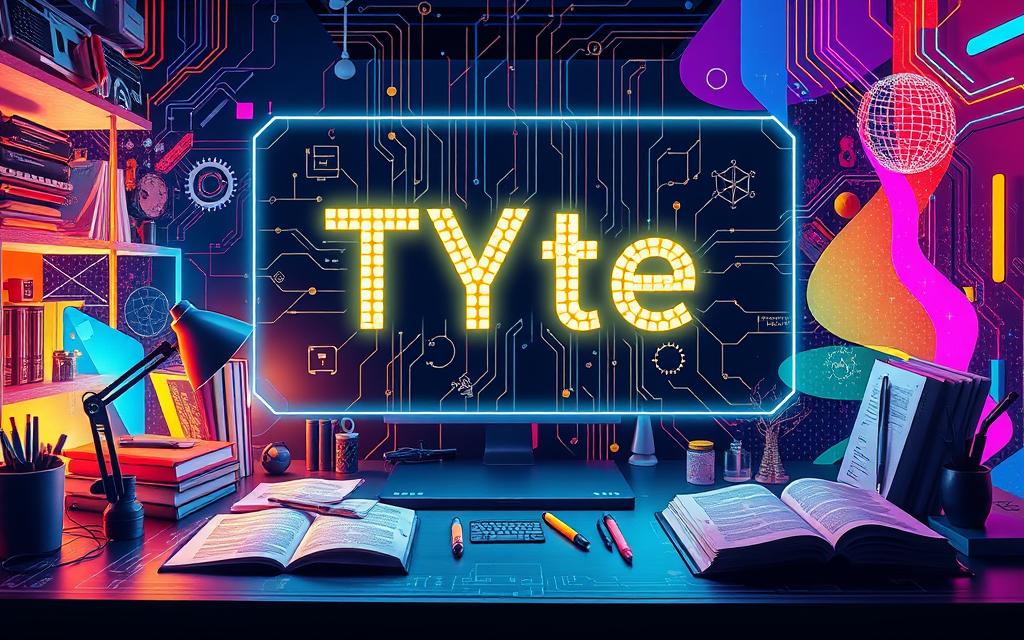NLP for Content Creation: Revolutionizing Writing
Did you know AI can write a 300-word article in just three seconds? This shows how fast Natural Language Processing (NLP) works. It’s changing content marketing a lot. As businesses move online, knowing about NLP is key.
The market for AI in content creation is growing fast. Using these tools can make work better and more engaging.
NLP makes writing easier by doing research and creating content. This lets writers add more personal touches. Companies are using AI to make their content better and more relevant.
This change is making content creation better. We’ll look at how NLP is changing writing, making it more efficient. And how it’s shaping the future of digital marketing.
Key Takeaways
- NLP streamlines tasks, augmenting efficiency and productivity in content creation.
- AI-powered tools analyze vast amounts of data for accurate, trend-aligned content.
- Businesses deploying AI strategies will remain competitive by personalizing content effectively.
- The balance between machine efficiency and human creativity is crucial for compelling writing.
- Understanding NLP applications is essential, as they enhance SEO and engagement levels.
Introduction to AI in Content Creation
Artificial intelligence is changing how we create content. More companies are using AI to make their work better and faster. By 2022, over a third of businesses had started using AI in their work.
This shows how much we rely on AI for tasks that used to take a lot of human effort.
Tools like GPT-4 help make all sorts of content, from articles to social media posts. Using AI makes writing faster and helps create content that fits what each person likes. AI is great at finding and sharing the best information.
AI also helps with making content easier to find online. It suggests keywords and checks how well content does, helping it show up more in searches. Plus, AI analyzes how people interact with content, helping make it even better.
But, using AI can be tricky, like keeping quality high and dealing with ethics. Still, AI’s role in creating content is huge. It helps businesses work more efficiently, making it key for marketing today. For more on this, check out the article here.
Understanding Natural Language Processing for Content Creation
Natural Language Processing (NLP) is key in content creation. It helps businesses write better and faster. Define NLP as a part of AI that lets machines understand human language. This tech changes how brands talk to their audience.
What is Natural Language Processing (NLP)?
NLP uses special methods and algorithms to handle human language. It’s used in many fields like finance, retail, and medicine. For example, in finance, NLP helps analyze big data for market insights.
Retail uses it for sentiment analysis to see what people think on social media. In medicine, NLP quickly goes through medical records to help patients better. These tasks need deep learning to understand and improve content.
How NLP Enhances Content Quality
NLP makes content better by finding ways to improve through data. It analyzes content to see if it meets user needs and SEO standards. This results in content that’s clear, engaging, and good for search engines.
Also, NLP uses stats to guess what users might like. This helps in making content that people will enjoy and find useful.
The Significance of AI in Content Strategy
AI is changing how we approach content strategy in many fields, including digital marketing. It’s becoming more important every day. Today, 76% of marketers use AI for basic content creation, and 71% use it to spark new ideas.
These numbers show how AI is making a big difference in business. It makes workflows smoother, which helps businesses work better.
Current Statistics on AI Adoption
More and more people are using AI for their content marketing plans. AI helps marketers keep up with content needs without needing to hire more writers. The AI text generators market was worth $392 million in 2022 and is expected to grow by 17.3% each year until 2030.
This shows how crucial AI is in today’s marketing world.
The Impact of AI on Business Efficiency
AI has a huge effect on how businesses work. Companies using AI in their content plans see big improvements in how fast they work and how much they save. AI lets marketers make great content quickly, so they can focus on bigger, more important tasks.
AI is predicted to save marketers five hours of prep work every week. This means big gains in how well businesses operate.

Benefits of Using NLP for Content Generation
Natural Language Processing (NLP) changes how businesses make and share content. It uses AI to save time and make content quickly. This is key in today’s fast digital world.
Time-Saving Content Production
NLP cuts down the time needed for content tasks. It can write lots of text in seconds. This makes brainstorming, writing, and editing faster.
By doing repetitive tasks, businesses can work smarter. They can focus on big ideas and plans.
Improved SEO and Visibility
Good content is key to standing out online. NLP tools help make content better for search engines. They find the right keywords and improve search rankings.
This means more people see your content. It helps you reach more people and connect better with them.
Enhanced User Engagement
Personalized content grabs attention and keeps people interested. NLP makes content that fits what users like. This makes users more engaged and likely to buy.
Companies that use this approach keep more customers. They build strong relationships with their audience.
How NLP Transforms the Writing Process
Natural Language Processing (NLP) changes the way we write. It uses idea generation and topic modeling tools to make content better. These tools look at what’s already out there and what people like, giving writers new ideas.
This means the content is not only new but also hits the mark with the audience.
Idea Generation and Topic Modeling
NLP helps writers find new ideas by looking at lots of data. This lets them stay on top of trends and new ideas. With topic modeling tools, writers can quickly come up with different views for articles.
This keeps them competitive.
Text Summarization Capabilities
NLP is also great at making summaries. It can take long texts and make them shorter without losing important details. This is key for clear communication.
With AI summarization, writers can share information in a way that’s easy to understand. It makes complex ideas easier to grasp.
Personalization for Target Audiences
NLP also helps make content that’s just right for each audience. It uses data to create content that speaks to specific groups. This approach makes readers more engaged and happy.
It makes marketing more effective because the content really connects with the audience.
Techniques for NLP-based Content Creation
NLP brings new ways to create content, changing how writers connect with their audience. Techniques like text analysis and sentiment analysis help understand how people react. This lets creators make content that meets what their audience wants and likes.
Text Analysis and Sentiment Analysis
Text analysis digs into big data to find important insights. It shows trends and patterns that help shape content plans. Sentiment analysis adds to this by sorting text as positive, negative, or neutral.
This helps businesses get a clear picture of what customers feel. They can see if people are happy or upset. This knowledge helps make content that really speaks to the audience.
Machine Translation and Language Modeling
Machine translation helps break language barriers, letting content reach more people worldwide. It’s key for businesses wanting to connect with a global audience. Language modeling takes it further by making AI write like a human.
This makes creating content easier and more natural. It helps reach people with different language preferences, expanding a brand’s reach.

Top NLP Tools for Content Creators
Natural Language Processing (NLP) tools have changed how we create content. Writers and marketers now use advanced AI tools to boost their work. Tools like GPT-3, Copy.ai, and Jarvis by Conversion.ai help with blogs, social media, and emails.
These tools let content creators pick the best tool for their needs. This way, they can focus on their goals.
Comparative Insights on Popular Tools
Top NLP tools like IBM Watson and SpaCy are known for their versatility. They help make content better and faster. Tools like Shopify Magic are great for e-commerce, helping with product descriptions and emails.
Each tool has special features that help writers improve their work. This makes their job easier and faster.
Integration of NLP Tools in Content Workflow
Integrating NLP tools into workflows is key. It automates tasks and lets writers focus on creativity. This makes content creation more efficient.
Using AI tools, teams can handle surveys, big data, and create stories. This makes content creation smoother.
Challenges of Implementing NLP in Content Creation
Using Natural Language Processing (NLP) in content creation comes with its own set of challenges. These tools aim to make things more efficient but show AI creativity limits. AI text often misses the creativity and emotional depth that humans add to stories and brand messages. This can lead to creative content struggles and lower audience interest.
Limited Creativity in AI-generated Content
One big AI writing challenge is how AI content can feel too formulaic. These systems can produce lots of text fast but often lack the unique voice or style needed for engaging stories. Relying only on AI for content can make it seem generic and fail to connect with readers on a personal level.
Ethical Considerations and Misuse Risks
As AI gets better, so do the ethical concerns around its use. Algorithms or training data can introduce biases, leading to unfair or misleading content. Companies must focus on ethical AI practices to avoid AI misuse risks. This means being open about how AI is developed and checking for biases. It’s crucial to handle this carefully to avoid spreading false information and influencing people’s views.
Dealing with NLP isn’t just about technical issues. It also involves understanding language differences and the complexity of human communication. This requires careful planning and a deep look at these challenges. For more on these issues, check out detailed discussions in sources like the challenges in NLP.
Best Practices for Leveraging NLP in Content Writing
Using Natural Language Processing (NLP) in content writing needs a smart plan. It’s about mixing AI with human creativity. This mix helps writers create better content that people enjoy reading.
Balancing AI and Human Creativity
AI can save a lot of time, but don’t rely on it too much. The best content comes from a mix of human ideas and AI tools. This way, the content is unique and meets what readers want.
Ensuring Quality and Originality in AI-generated Content
Keeping content fresh means checking AI work often. This helps make sure it’s relevant and valuable. Editing AI content helps avoid plagiarism and makes it better.
Good quality control makes AI content worth reading. It meets search engine standards and gives readers useful information. Learn more about using NLP for better content here.
Future Trends in AI and NLP for Content Marketing
The world of content marketing is about to change a lot thanks to AI and NLP. New technologies are making it easier for businesses to create and share content. This means they can connect better with their audience.
As machine learning gets better, content makers will have tools that work even harder. These tools will help make content more effective.
Emerging Technologies in Content Creation
AI is changing how we make content. It makes it faster and better, without losing quality. Tools that use AI can create content that fits exactly what people want to see.
These tools can also change what they do based on how well they’re doing. This means messages can stay fresh and interesting everywhere they’re seen.
Predictive Analytics and User Behavior Insights
Predictive analytics are key to knowing what people want. AI helps figure out what customers like, so businesses can meet their needs. This helps companies make their marketing better.
By using what they learn from users, businesses can get more people involved. This is why using advanced analytics with NLP is so important in marketing today.
Conclusion
Natural Language Processing (NLP) is changing how we write. It uses advanced methods like semantic analysis and generation. This makes content better and faster to create.
Companies in many fields are using NLP to make content that speaks to their audience. They can improve how they talk to customers and make marketing that really connects. Tools like ChatGPT and programming languages like Python help marketers get ideas and solve writing problems.
The future of writing looks bright with NLP. We’ll see better systems for many languages and understanding feelings in text. By working together with AI and human creativity, we can make amazing content. This will help businesses grow and succeed online.
FAQ
What is Natural Language Processing (NLP)?
Natural Language Processing (NLP) is a part of artificial intelligence. It helps computers understand and create human language. This includes tasks like text editing and analyzing feelings in text to make content better.
How does NLP enhance content quality?
NLP makes content better by improving how language is used and making it easier to read. It also gives insights on how well content is doing with readers. This way, content can be more engaging and better for search engines.
What are the key benefits of using NLP for content generation?
Using NLP for content saves time and boosts SEO. It also makes content more engaging for users. This helps marketers create content that really speaks to their audience.
How does AI impact business efficiency in content creation?
AI makes content creation faster and better. It automates tasks and lets marketers focus on creative ideas. Companies using AI see faster work and lower costs, making their content strategies stronger.
What techniques can be used in NLP-based content creation?
NLP uses text analysis and sentiment analysis to understand feedback and feelings. It also does machine translation and language modeling to create natural-sounding text.
What are some popular NLP tools for content creators?
Popular NLP tools include GPT-3 by OpenAI, Copy.ai, and Jarvis by Conversion.ai. These tools help with different types of content, making writing easier and more efficient.
What challenges arise when implementing NLP in content creation?
Using NLP can lead to less creative content and ethical issues like bias. It’s important for companies to use AI responsibly to avoid these problems.
How can content creators ensure quality and originality in AI-generated content?
To ensure quality, content creators should edit and proofread AI content carefully. Regular checks and adjustments help avoid plagiarism and improve content value.
What future trends should we expect in AI and NLP for content marketing?
We can expect better content creation and deeper insights into user behavior. These advancements will help marketers make better decisions and improve their strategies.







